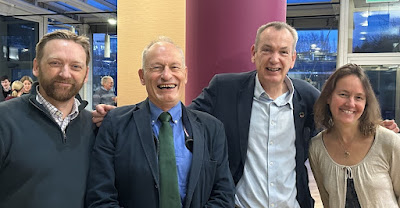91. Air and Climate Challenges in the City Region, UWE Bristol, 11 December 2023
I was
invited to the University of the West of England to celebrate the retirement of
Professor Jim Longhurst with a day of Air Quality and Carbon Management
presentations. It was a great
opportunity to catch up with friends from the University, Bristol and
Environment Agency.
The day started with a retrospective look at the problems of poor air quality caused by the industrial revolution. We saw the impact of pollution in Widnes and heard about the development of air pollution control. Robert Angus Smith who was the first Chief Inspector of the Alkali Inspectorate (1817-1884) lived and worked in Manchester for 40 years. Following his research on air quality, he was the first person to use the term “acid rain”. We heard the history of the UK sulphurous smogs including the great London Smog from Friday 5 December to Tuesday 9 December 1952. About 4,000 people were known to have died as a result of the fog, but it was likely to have been many more. We were reminded of the slow response of government, the resistance to action from interested groups including those connected with the coal and electricity industries. Eventually the Clean Air Acts of 1956 and 1968 banned emissions of black smoke and required residents in urban areas and factories to use smokeless fuels. Due to the implementation period, fogs continued for some time after the passing of the 1956 Act.
We then
heard from representatives from South Gloucestershire Council and Bristol City
Council on their response to the climate emergency followed by speakers from
Bristol Green Capital Partnership and Bristol Advisory Committee on Climate
Change on community collective action.
It was great to hear that the partnership between the City Council,
businesses, communities and learning bodies is continuing to flourish since
Bristol was the European Green Capital in 2015 (picture above).
After some fascinating, discouraging and encouraging conversations over lunch, we heard about the university research on air quality, net zero, low cost sensors, carbon communications and empowering communities. We were given examples of the Universities’ successful collaborative working with businesses and communities including the innovative Innovation Networks (iNets). Finally, we heard about climate and sustainability education and the practical steps universities can take to decarbonise. Students and young people now are so much better informed and committed to taking action compared with previous generations.
Reflecting
at the end of the day, despite the setbacks and resistance to change from some
of our leaders, I was very encouraged to see the passion and drive, the
research and evidence that will tackle the air and climate challenges that the
world currently faces.
My thanks to
Professor Enda Hayes and Professor Jo Barnes for arranging such an enjoyable
and successful event. Keep up the good
work!







Comments
Post a Comment